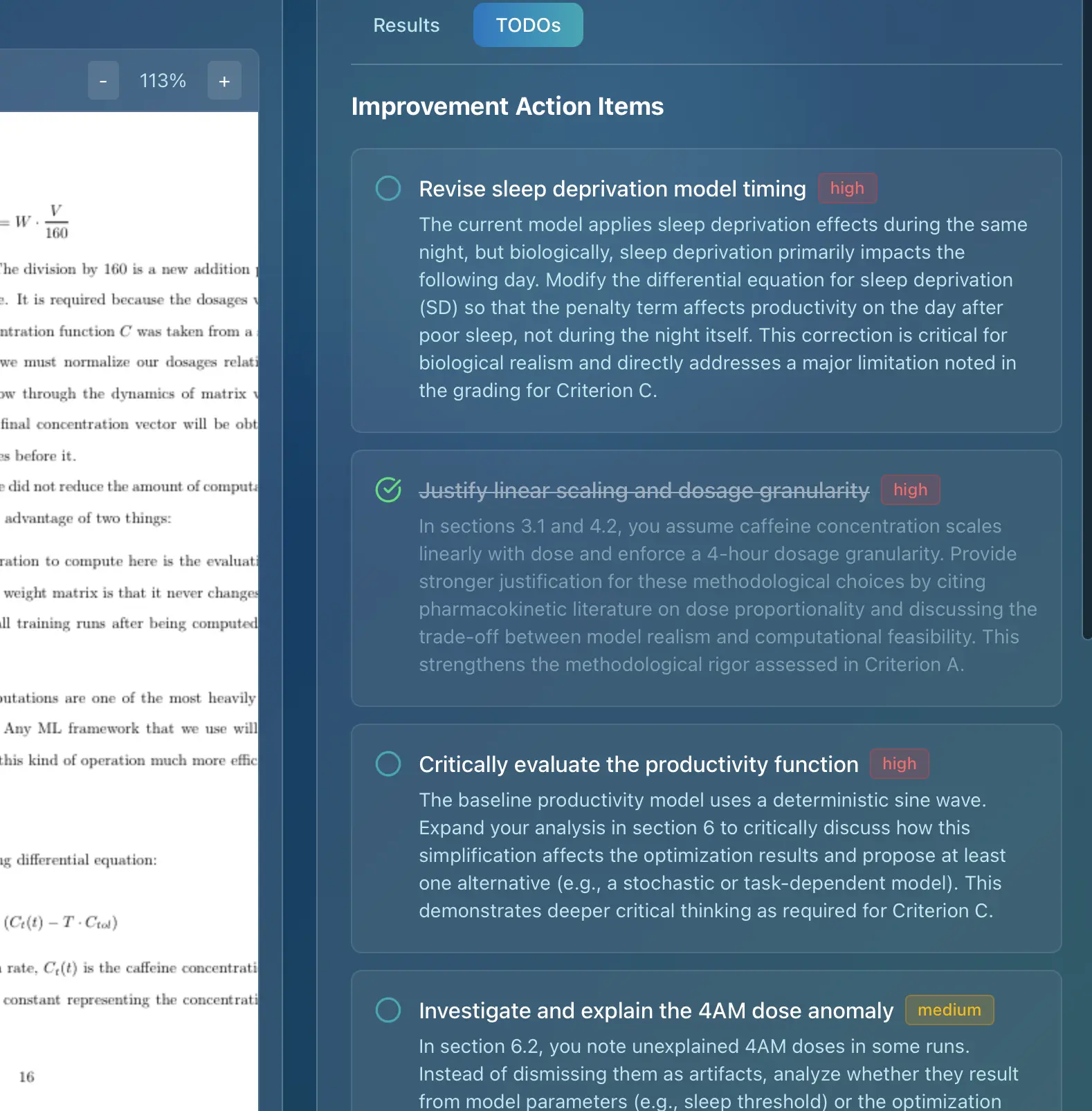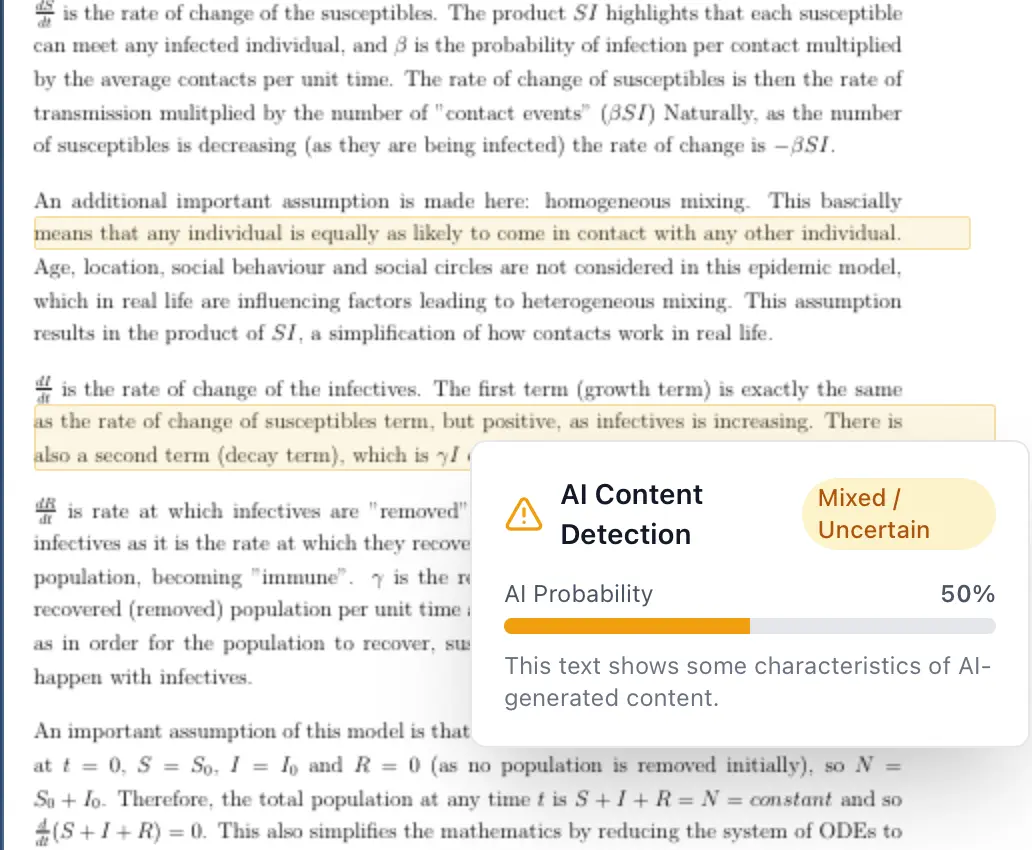Mastering the IB Computer Science Extended Essay Criteria: A Comprehensive Guide
Struggling to understand the IB Computer Science Extended Essay grading criteria? This comprehensive guide breaks down each criterion, providing clear explanations, practical tips, and actionable advice to help you achieve top marks. We'll cover everything from Focus and Method to Engagement, ensuring you understand exactly what examiners are looking for and how to meet the IB standards. This guide also touches on the role of AI grading assistants in modern assessment.
What is the Computer Science Extended Essay?
The Computer Science Extended Essay is a 4,000-word independent research paper that forms a core component of the International Baccalaureate (IB) Diploma Programme. It provides students with an opportunity to explore a computer science topic of their choice in depth, developing research, analytical, and writing skills. The essay is externally assessed and contributes significantly to the final IB score.
Struggling with IB Assessments?
Get instant, detailed feedback on your work with AI that understands IB criteria.

Understanding the Grading Criteria
The IB Computer Science Extended Essay is assessed against five criteria: Focus and Method, Knowledge and Understanding, Critical Thinking, Presentation, and Engagement. Each criterion carries a specific weight, contributing to the overall score out of 34. Understanding these criteria is crucial for planning, writing, and refining your essay to meet the IB's expectations.
Detailed Breakdown of Computer Science Extended Essay Criteria
Criterion A: Focus and Method (6 marks)
What it assesses: This criterion assesses the clarity of your research question, the rationale for choosing your topic, and the appropriateness of your chosen methodology. It's about demonstrating that you have a clear direction and a sound plan for your research.
Mark bands:
- 0 Marks: The essay lacks a clear focus, the research question is absent or poorly defined, and the methodology is not described or is inappropriate.
- 1-2 Marks: The research question is present but lacks focus or is too broad. The rationale for the topic is weak, and the methodology is vaguely described.
- 3-4 Marks: The research question is reasonably focused and relevant to computer science. The rationale for the topic is explained, and the methodology is described, but may lack detail.
- 5-6 Marks: The research question is sharply focused, accessible, and clearly related to computer science. The rationale for the topic is well-explained, the methodology is clearly described and justified, and authoritative sources are utilized.
Tips for success:
- Choose a specific and manageable research question: Avoid overly broad topics. For example, instead of "The impact of AI," consider "The effectiveness of convolutional neural networks in image recognition for medical diagnosis."
- Clearly justify your topic's relevance: Explain why your chosen topic is important and how it contributes to the field of computer science.
- Provide a detailed and justified methodology: Explain the steps you will take to answer your research question, including data collection methods, algorithms used, and evaluation metrics. Justify why these methods are appropriate for your research.
- Use authoritative sources: Rely on peer-reviewed academic papers, reputable journals, and established textbooks to support your methodology and arguments.
Criterion B: Knowledge and Understanding (6 marks)
What it assesses: This criterion evaluates your understanding of the subject matter, demonstrated through the use of appropriate terminology, explanations of information from sources, and evidence of personal comprehension.
Mark bands:
- 0 Marks: The essay demonstrates little to no understanding of the subject matter. Terminology is absent or misused, and information from sources is not explained.
- 1-2 Marks: The essay demonstrates limited understanding of the subject matter. Terminology is used sparingly or inappropriately, and explanations of information from sources are superficial.
- 3-4 Marks: The essay demonstrates a reasonable understanding of the subject matter. Terminology is used appropriately, and explanations of information from sources are provided, but may lack depth.
- 5-6 Marks: The essay demonstrates a strong understanding of the subject matter. Terminology is used accurately and effectively, explanations of information from sources are clear and insightful, and personal comprehension is evident.
Tips for success:
- Use precise computer science terminology: Avoid vague or ambiguous language. Define key terms and concepts clearly.
- Explain information from sources in your own words: Don't just copy and paste information. Demonstrate that you understand the concepts by explaining them in your own terms.
- Show personal comprehension: Go beyond simply summarizing information. Analyze and interpret the information, and draw your own conclusions.
- Provide examples and illustrations: Use concrete examples to illustrate your understanding of complex concepts.
Criterion C: Critical Thinking (12 marks)
What it assesses: This criterion assesses your ability to research, analyze, discuss, and evaluate information critically, leading to well-supported conclusions. It's the most heavily weighted criterion, emphasizing the importance of analytical and evaluative skills.
Mark bands:
- 0 Marks: The essay lacks critical thinking. Research is superficial, analysis is absent, discussion is limited, and evaluation is not present.
- 1-4 Marks: The essay demonstrates limited critical thinking. Research is basic, analysis is weak, discussion is superficial, and evaluation is minimal. Conclusions are unsupported.
- 5-8 Marks: The essay demonstrates reasonable critical thinking. Research is relevant, analysis is present but may lack depth, discussion is adequate, and evaluation is attempted. Conclusions are partially supported.
- 9-12 Marks: The essay demonstrates strong critical thinking. Research is thorough and relevant, analysis is insightful and well-supported, discussion is comprehensive, and evaluation is effective. Conclusions are justified and consider limitations and future research.
Tips for success:
- Conduct thorough and relevant research: Go beyond basic internet searches. Consult academic databases, journals, and conference proceedings.
- Analyze information in depth: Break down complex concepts into smaller parts and examine their relationships. Identify patterns, trends, and anomalies.
- Engage in comprehensive discussion: Explore different perspectives and viewpoints. Consider the strengths and weaknesses of different arguments.
- Evaluate information effectively: Assess the credibility and reliability of sources. Identify biases and limitations.
- Draw well-supported conclusions: Base your conclusions on evidence and analysis. Justify your claims and consider alternative explanations.
- Acknowledge limitations and suggest future research: Demonstrate awareness of the limitations of your research and suggest areas for further investigation.
Criterion D: Presentation (4 marks)
What it assesses: This criterion assesses the structure, layout, and adherence to academic standards, ensuring the essay is clear, easy to understand, and meets the formal requirements.
Mark bands:
- 0 Marks: The essay lacks structure and organization. Academic standards are not met, and referencing is absent or inaccurate.
- 1 Mark: The essay demonstrates some structure, but organization is weak. Some academic standards are met, and referencing is attempted but may be incomplete or inaccurate.
- 2-3 Marks: The essay is generally well-structured and organized. Academic standards are mostly met, and referencing is generally accurate and complete.
- 4 Marks: The essay is well-structured, organized, and adheres to academic standards. Referencing is accurate, complete, and consistent. The presentation enhances reader comprehension.
Tips for success:
- Use a clear and logical structure: Organize your essay into distinct sections with clear headings and subheadings.
- Adhere to academic standards: Follow the IB's guidelines for formatting, referencing, and citation.
- Use accurate and consistent referencing: Use a consistent citation style (e.g., MLA, APA) and ensure that all sources are properly cited.
- Use visuals effectively: Incorporate diagrams, charts, and graphs to illustrate your points and enhance reader comprehension.
- Proofread carefully: Check for grammatical errors, spelling mistakes, and typos.
Criterion E: Engagement (6 marks)
What it assesses: This criterion assesses your engagement with the research process, demonstrated through reflection on decision-making, planning, and the development of skills. This is demonstrated in the Reflections on Planning and Progress Form (RPPF).
Mark bands:
- 0 Marks: The essay lacks reflection on the research process. There is no evidence of engagement with the topic or the methodology.
- 1-2 Marks: The essay includes limited reflection on the research process. Engagement with the topic and methodology is superficial.
- 3-4 Marks: The essay includes reasonable reflection on the research process. Engagement with the topic and methodology is evident, but may lack depth.
- 5-6 Marks: The essay includes insightful and critical reflection on the research process. Engagement with the topic and methodology is strong, demonstrating rationale, skills developed, and potential improvements for future research.
Tips for success:
- Reflect on your decision-making process: Explain why you chose your topic, research question, and methodology.
- Discuss your planning process: Describe how you planned and organized your research.
- Reflect on the skills you developed: Identify the skills you developed during the research process, such as research skills, analytical skills, and writing skills.
- Discuss challenges and how you overcame them: Describe any challenges you faced during the research process and how you overcame them.
- Suggest potential improvements for future research: Reflect on what you would do differently if you were to conduct the research again.
How to Excel in Your Computer Science Extended Essay
- Start early: Begin planning your essay well in advance of the deadline.
- Choose a topic you are passionate about: This will make the research process more enjoyable and engaging.
- Develop a clear research question: A well-defined research question is essential for a focused and successful essay.
- Plan your research carefully: Develop a detailed research plan and stick to it as much as possible.
- Seek feedback from your supervisor: Regularly meet with your supervisor to discuss your progress and get feedback.
- Revise and edit your essay thoroughly: Proofread your essay carefully and make sure it is well-written and error-free.
Pro Tip: Get AI-Powered Grading
Stop second-guessing your grades. Get instant feedback aligned with official IB rubrics.

Common Mistakes to Avoid
- Choosing a topic that is too broad or too narrow: Select a topic that is manageable within the word limit.
- Failing to develop a clear research question: A vague or poorly defined research question will lead to a disorganized and unfocused essay.
- Plagiarizing sources: Always cite your sources properly to avoid plagiarism.
- Failing to meet the IB's formatting requirements: Adhere to the IB's guidelines for formatting, referencing, and citation.
- Leaving the essay to the last minute: Starting the essay late will result in a rushed and poorly written paper.
The Role of AI in Modern Assessment
Modern technology is revolutionizing how we approach academic assessment. AI-powered grading assistants can now help teachers maintain consistency and accuracy in their evaluations while saving valuable time. These tools use the same official IB criteria to provide detailed feedback and scoring, ensuring that assessments meet the high standards expected in IB programs.
For educators looking to streamline their grading process while maintaining the quality and consistency that IB computer science assessment demands, AI grading assistance offers a powerful solution that complements traditional teaching methods. This can be particularly useful for complex assessments like the extended essay and computer science IA requirements.
Conclusion
Mastering the IB Computer Science Extended Essay criteria is essential for achieving success in this challenging but rewarding assessment. By understanding the criteria, following the tips provided, and avoiding common mistakes, you can significantly improve your chances of earning a high grade. Remember to start early, choose a topic you are passionate about, and seek feedback from your supervisor throughout the process.
Looking for more support with IB assessment grading? Discover how AI-powered grading assistants can help maintain consistency and accuracy in your evaluations while saving valuable time. Learn more about modern grading solutions designed specifically for IB educators.